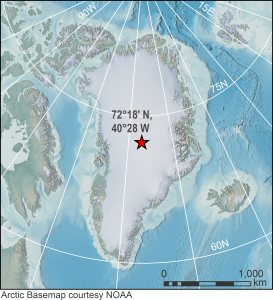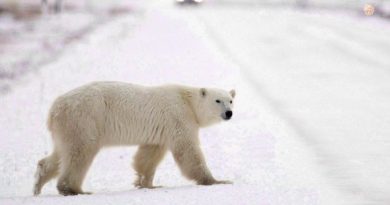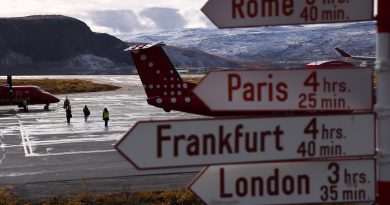WMO verifies -69.6 C northern hemisphere cold record in Greenland

The World Meteorological Organization (WMO) has recognized the coldest recorded temperature in the northern hemisphere as being -69.6 C that was recorded at an automatic weather station in Greenland almost thirty years ago.
The temperature, recorded on December 22, 1991, was uncovered by the WMO Archive of Weather and Climate Extremes.
The WMO archive, established in 2007, includes a range of records including the world’s highest and lowest temperatures, rainfall, heaviest hailstone, longest dry period, maximum gust of wind, longest lightning flash and weather-related mortalities.
Typically, the WMO Archive of Weather and Climate Extremes evaluates reported climate observations from within the last few years. But in the Greenland temperature case, it was climate historians who uncovered the record temperature.
The -69.6 C reading was discovered during the examination of an automated weather station in Klinck, Greenland, located at a 3,105 metre elevation near the topographic summit of the Greenland Ice Sheet.

The station had been established as part of a network by the University of Wisconsin-Madison to monitor weather conditions in the location. The station was returned to the laboratory in 1994 and was then sent to Antarctica.
“Climate detectives”
This was before the WMO Archive of Weather and Climate Extremes was established but the temperature was still able to be confirmed after investigators got in contact with the original scientists who they found had maintained the calibrations and metadata.
“This investigation highlights the ability of today’s climate scientists to not only identify modern climate records but to play ‘climate detective’ and uncover important past climate records—thereby creating a high-quality long-term record of climate for climate-sensitive regions of the world,” said Randall Cerveny, rapporteur of Climate and Weather Extremes for WMO, in a news release on Wednesday.
The record Greenland temperature of -69.6 beats the previous northern hemisphere cold record of -67.8 C logged in Verkhoyanksk, Russia in February 1892, and in Oimekon, Russia in January 1933.
From coldest to hottest
Verkhoyanksk was also recently in the news this June for reporting a 38 C temperature, the highest logged reading in the Arctic Circle.

To verify the June 2020 reading, the WMO will contact the Russian meteorological agency to get the actual data, confirm the type of equipment used, and get more information on quality checks, instrument calibration, monitoring techniques and data from corresponding stations. The WMO will also probe other historical occurrences of high temperatures in the Arctic Circle as part of their investigation.
“In the era of climate change, much attention focuses on new heat records,” said WMO Secretary-General Professor Petteri Taalas.
“This newly recognized cold record is an important reminder about the stark contrasts that exist on this planet. It is testimony to the dedication of climate scientists and weather historians that we are now able to investigate many of these older records and secure a better global understanding of not only current, but also historical, climate extremes.”
The world’s all-time coldest temperature, -89.2 C, was recorded on July 21, 1983 in Antarctica.
Write to Eilís Quinn at eilis.quinn(at)cbc.ca
Related stories from around the North:
Canada: What the Arctic’s transition to a ‘new climate’ looks like, CBC News
Greenland: A big chunk of Greenland’s ice cap breaks off as Arctic shifts to new climate regime, The Associated Press
Finland: Miners hunting for metals to battery cars threaten Finland’s Sámi reindeer herders’ homeland, Yle News
Iceland: Arctic Science Ministerial postponed to 2021 due to COVID-19, Eye on the Arctic
Norway: Climate change hits back at Svalbard, coal mine flooded by melting glacier in Norway, The Independent Barents Observer
Russia: Record-warm Arctic summer fatal to wild reindeer in Russia, say environmentalists, The Independent Barents Observer
Sweden: Extra billions to SAS – but with stricter climate requirements, Radio Sweden
United States: Bering Sea ice at lowest extent in at least 5,500 years, study says, Alaska Public Media



